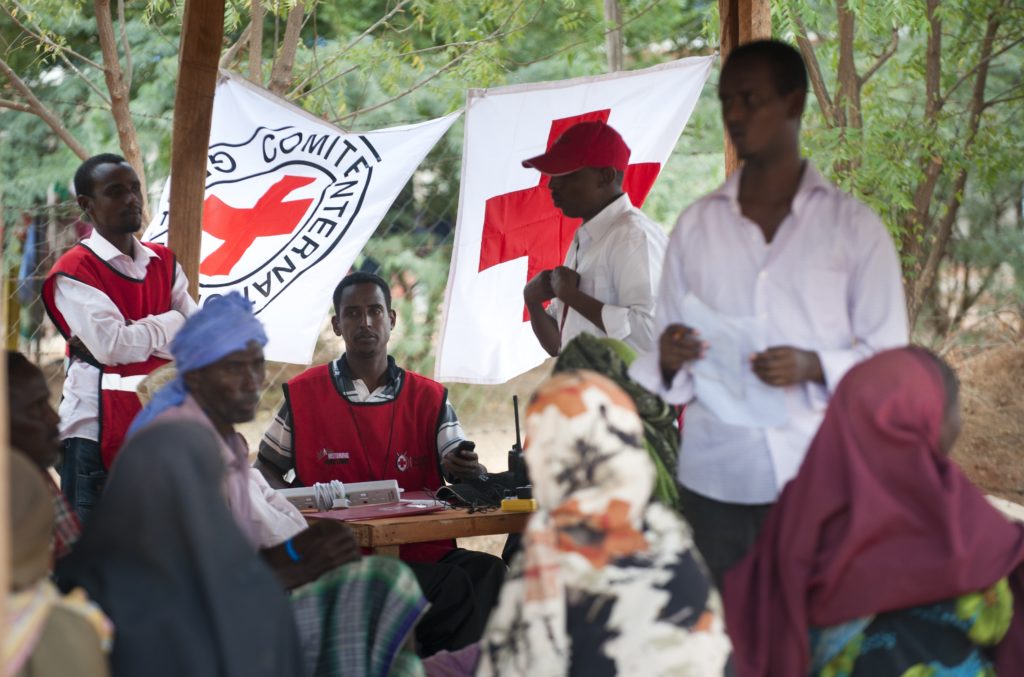Mark Owens, an American Red Cross case worker in the Restoring Family Links program, is on a two-week visit to Kenya. He is working with Red Cross colleagues in the sprawling refugee camps of Dadaab, hoping to reconnect families separated amid the crisis in the Horn of Africa. This is his first story sent from the field.

The Kenya Red Cross is assisting those displaced by drought in the Horn of Africa in host communities in and around the Dadaab refugee camps. They are providing food, water, relief supplies and family linking services in partnership with the ICRC.
Photo by: Olav A Saltbones
On the way to Dadaab refugee camp in eastern Kenya, we drive for hours seeing nothing but a relentlessly harsh expanse of white-hot sand and ash-colored thorn bushes. A bright blue sky extends for an eternity overhead, shimmering where it meets the scorched earth at the horizon. Occasionally, we pass the relics of lives that could not survive in this place where the earth has long forgotten the taste of rain. The sun-baked bones of a camel here, an abandoned village – huts reduced to sticks poking out of the sand — there. Then more miles go by with no signs of life anywhere. A group of camels followed by their lonely herder appear on the horizon, a strange sight where the only thing that moves in this place is the fiery wind, picking up clouds of sand in its path.
It seems that nothing could survive here in Dadaab, yet we arrive at our destination and see a place that is filled beyond capacity with refugees who fled brutal warfare and drought in Somalia. Dadaab (actually a complex of three camps in close proximity) was opened in 1991 to house 90,000 people, yet now it is home to 432,000 refugees spilling over the original boundaries of the camp into makeshift plots that spread out for miles in every direction. These are people who ran from such a desperate place that even this harsh corner of Kenyan desert is considered a refuge.
At the camp’s registration center, newly arrived refugees congregate and wait in line to be officially registered. They also receive information about programs and services available to them. One of these services is the Restoring Family Links mobile tracing program. This program, administered by the Kenyan Red Cross with support from the International Committee of the Red Cross, enables newly arrived refugees to make phone calls to their relatives to let them know that they have arrived safely at the camp. Kenyan Red Cross volunteers set up and manage stations in the camp where a refugee can come to use a mobile phone, making a brief call to restore the vital link with relatives back home. The program has been operating in the camp since August, and now nearly 7,000 people have made calls using the service.
Looking around the registration area, I see despair in the eyes of many refugees. But when they find out about the services available at the Kenyan Red Cross mobile tracing tent, those shell-shocked looks of despair turn to joy and excitement. People wait expectantly in line for the chance to make their calls home. They want to tell their loved-ones that they are ok, that they have made it to this place of refuge. It would be easy to be overwhelmed by the sadness of this place, but when I look into the eyes of a grandmother holding her grandson in one hand and a mobile phone with the other and see her broad, gleaming smile, I am filled with a sense of hope. It’s comforting to think that even in this place, where it seems nothing could survive, the vital link between loved-ones can live on.
